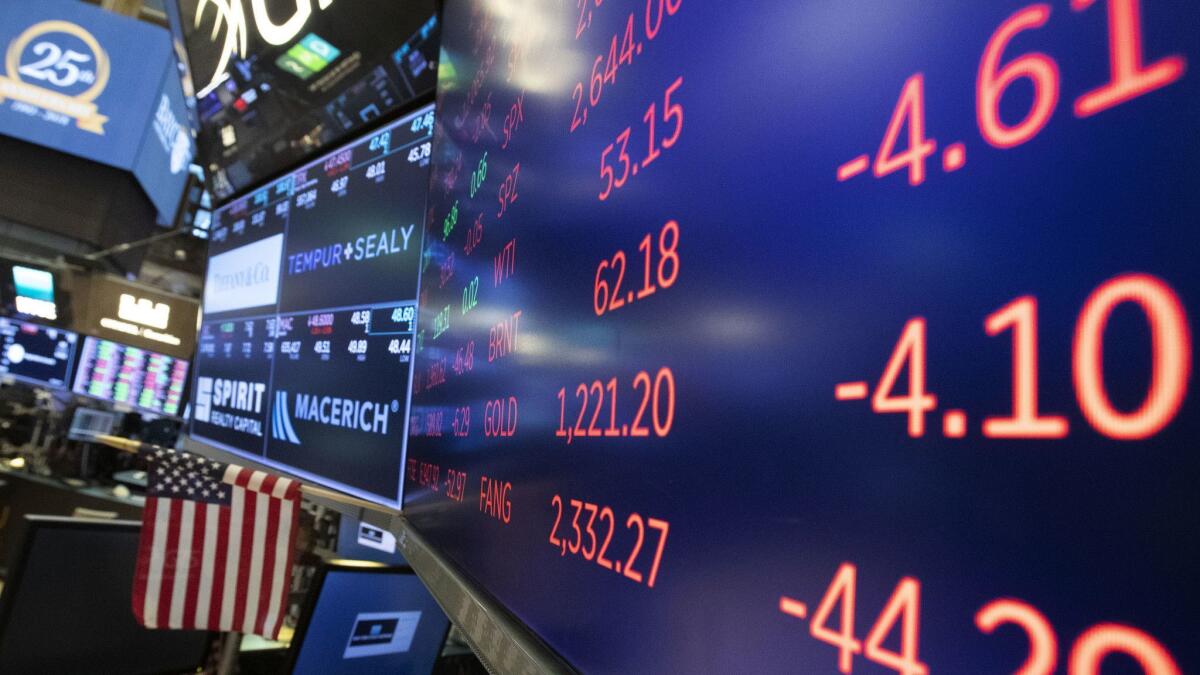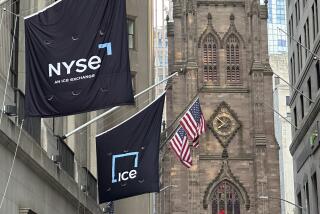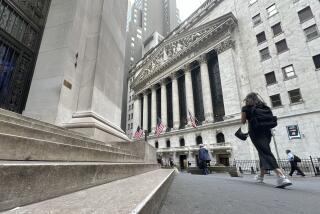Tech-driven stock market plunge raises worries that long rally is finally over

Reporting from Washington — There may not be an alert on your iPhone yet, but it looks as if the years-long stock market party might just be over.
A recent plunge in share prices of U.S. technology giants spread like a software virus through the entire market Tuesday, triggering a broad sell-off that wiped out this year’s gains for the major indexes after they all hit record highs in recent months.
Concerns about the trade war with China were a catalyst for steep drops in stock prices for a quintet of major tech firms known by the acronym FAANG — Facebook, Amazon, Apple, Netflix and Google parent Alphabet — that had been buoying financial markets even as corporate earnings and economic growth slipped in the second half of the year.
Collectively, those tech titans have lost about $1 trillion in market value in recent weeks, and those five companies led the market declines this week in a sell-off that began Monday and spread to banks, retailers and energy companies.
Crude oil prices slid too, reflecting weakening demand for the commodity as economies slow in China and elsewhere across the globe. Once hot cryptocurrencies also continued to lose luster, with bitcoin dropping as much as 13% to $4,051. A year ago it hit $19,000.
“If you asked people two months ago what was the future of Amazon, it was going to control the world. Now people are saying well maybe not. Facebook was going to dominate social media for the foreseeable future, now maybe not so much.The iPhone was going to be the only phone anybody ever wanted. Now maybe not so much,” said John Bollinger, president of Bollinger Capital Management in Redondo Beach.
“Now people are scared. People bought those stocks like there was no tomorrow … they bid them to absolutely unsustainable levels and what we’re seeing is a normal unwinding of a speculative bubble in technology,” he said.
The stock losses were heavy Tuesday across the board.
The Dow Jones industrial average fell 551.8 points, or 2.2%, to 24,465.64. On top of Monday’s nearly 400-point decline, the index is now down 1% for the year. The broader Standard & Poor’s 500 index dropped 1.8%. It is now off 1.2% for 2018.
The Nasdaq composite declined 1.7% and now is basically flat for the year, up just .08%. The tech-heavy index has tumbled 15% from the record high it hit less than three months ago. A separate index of the FAANG stocks has plummeted even further, about 31% over the last five months.
Retailers’ stocks took a hit just days before the official start of the holiday shopping season, predicted to be one of the strongest in years amid low unemployment and high consumer confidence. But rising costs because of U.S. tariffs and wage gains are eating into earnings. The big trigger Tuesday was Target, which reported declining profit margins, sending its shares plunging nearly 11%.
Analysts said the downturn appeared to be in the neighborhood of a so-called correction, in which stock indexes decline 10% or more from their recent high, rather than the start of a more ominous bear market. In addition to the Nasdaq’s 15% decline, the Dow is off 8.8% from its recent record high and the S&P 500 is down 9.9%.
The major indexes went through a correction earlier this year — triggered by two 1,000-point drops in the Dow in a single week — presaging what is turning out to be a bad year for stocks. But the indexes recovered and reached record highs before encountering more turbulence this fall.
A bear market, in which stock indexes drop more than 20%, often foreshadows a recession. Risk of a recession is rising as the recovery from the Great Recession is nearly midway through its ninth year, but economists are not predicting one in the short term.
“I don’t see anything dire, but simply something cyclical,” Jack Ablin, chief investment officer at Cresset Wealth Advisors, an investment advisory firm, said of the stock market declines. “I don’t see a recession on the horizon.”
Still, he and other experts preached caution to investors during these rocky times. “I wouldn’t own one share of equity unless I had a seven-year time horizon,” Ablin said.
And the manager of the world’s largest hedge fund, Ray Dalio of Bridgewater Associates, predicted this week that the heady stock market returns of recent years were at an end.
“You need to prepare for lower expected returns in the future,” Dalio told Bloomberg.
While growth concerns have already cropped up overseas, the U.S. economy was insulated from that because of the large GOP tax cuts. They helped push U.S. economic growth to a 4.2% annual rate in the second quarter of the year, the best since 2014.
But now the initial stimulus from the large tax cuts has started to wear off, with growth slowing to 3.5% in third quarter and forecasts pointing to an annual growth rate of less than 3% in the fourth quarter.
The rising economic anxiety has not gone unnoticed by Federal Reserve officials, who have been raising a key interest rate slowly to avoid rising inflation from going too high. Those higher interest rates have made stocks a less attractive investment.
Fed Chairman Jerome H. Powell said last week that the central bank could slow its pace of rate hikes next year if economic growth slows significantly in 2019.
President Trump has publicly criticized the independent Fed for its rate hikes — a rare move for a sitting president. He reiterated those complaints Tuesday even as he expressed confidence in the U.S. economy and the stock market, whose records he has frequently touted as being spurred by his presidency.
“As a country, we’re doing great,” he told reporters before leaving the White House for Florida. “Our unemployment is at a record low.”
But he acknowledged the stock market’s travails. “I think your tech stocks have some problems, but that’ll come back,” he said.
Large technology stocks have been a key mover in the market’s long rally. Ablin said the stocks helped keep the major indexes climbing even as the performance of some sectors was slowing.
“Now that the last bastion of bull territory is rolling over it’s taking the rest of the market with it,” he said.
Apple’s shares were down nearly 5% Tuesday and is off 24% since early October. Amazon stock declined 1.1% Tuesday and was down almost 27% over the last three months.
There could be more trouble on the horizon.
Trump and China’s President Xi Jinping are scheduled to meet during the Group of 20 economic summit starting in late November. There is hope the two leaders can resolve the trade dispute. If the talks don’t produce progress, the markets could take another hit.
“I think the market has a trade deal with China priced into it right now,” Bollinger said. “If that doesn’t work out, I think we could see some more pain.”
Twitter: @JimPuzzanghera
More to Read
Inside the business of entertainment
The Wide Shot brings you news, analysis and insights on everything from streaming wars to production — and what it all means for the future.
You may occasionally receive promotional content from the Los Angeles Times.











